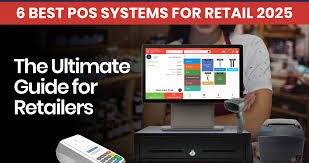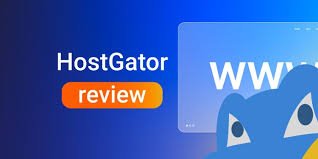Simply put, POS stands for “Point of Sale.” It’s the system where you ring up the customer, collect payment for the transaction, and collect sales tax.
A POS may be more complex than a standard cash register, but times have changed. Today, a typical POS system comes fully loaded with all sorts of features and devices, including inventory and replenishment tracking, customer loyalty programs, and employee management tools.
To save you the hassle, we’ve put together this guide to help you find the perfect, reliable, and feature-rich POS system for your business.
Our experts have tested multiple POS systems and ranked them among the top 10 for quality, efficiency, speed, price, and other important features.
After all the research, we can tell you what the best POS system of 2022 will be. Lightspeed is today’s best all-in-one POS provider that’s suitable for all types of businesses.
Our Top 10 Best Best Point-of-Sale Systems & Software in 2024:
Shopify. Best Point of Sale (POS) System
Toast: Best All-in-One System for Restaurant Management
Lightspeed: Best Full-Featured POS System
Advantages of POS: Ideal for Retail Stores Looking for Advanced One-Stop Point of Sale Features
TouchBistro: Best Analytics and Reporting Features for Restaurants
Clover: Best POS System
Square: Best for Fixed Fees
Flagman: Best for Affordability
SkyTab: Best All-in-One for Restaurant Management
Oracle Netsuite: Best for Large Businesses and Retailers
Compare The Best Point of Sales (POS) Systems
POS systems evolve along with the technology offered by vendors. Of course, each POS brand adapts to different business needs.
We’ve researched and selected the 10 best retail systems for small business owners and growing businesses.
Read all the details about the brands featured. You’ll learn the basics about monthly software fees, contract lengths, integrations, and more.
To make the best decision, check out our comparison chart.
You’ll learn more about POS systems and optimize your customer experience and payment processing.
A Closer Look at the Top 10 POS Systems
Prices range from $39/month
Ideal for businesses looking to integrate their physical and online sales systems.
Mobile compatibility: iPhone, iPad, and Android
Shopify is one of the leading online sales platforms. They’ve used that experience to create an easy-to-use POS system. If you’re already using Shopify for your online store, their POS system is a great option to offer your customers a seamless shopping experience, both in person and online. With a proven e-commerce platform, Shopify’s admin lets you manage all the products you sell across all of your locations, connecting in-store and online sales.
The Shopify POS app works on both iPad and Android. You’ll need to purchase a card reader in addition to any barcode scanners, printers, and cash registers you may need, but it helps keep monthly costs down because the cost of the rented equipment isn’t factored into your monthly bill. If you don’t want to sell online, the Lite plan is an affordable way to accept card payments. Monthly subscriptions can be expensive if you want to take advantage of all the available features, but the smart inventory management and multi-channel tools make it worth the investment for larger businesses.
Installation cost: $49
Contract length: Monthly or annual plans, two or three years
Pros
- Modern, easy-to-use interface
- Integrates with your Shopify online store
- Detailed analytics and reporting
Cons
- Higher-level plans are expensive
- Additional hardware costs
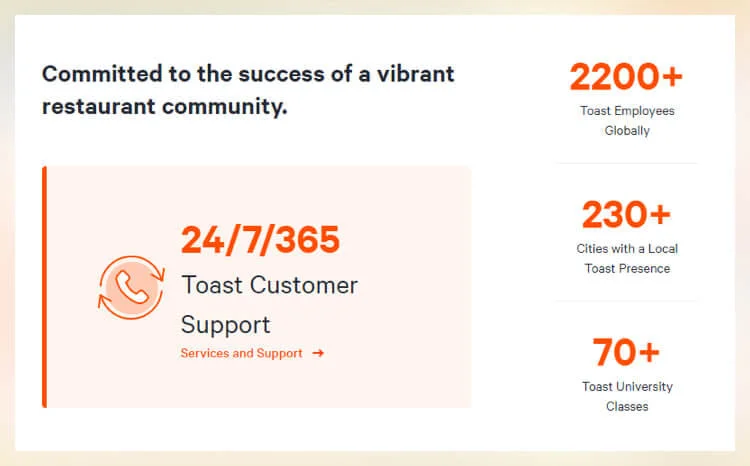
Price range: $0.00–$165.00 per month
Best services for foodservice businesses of all sizes
Mobile compatibility: Compatible with Android devices
Toast is a cloud-based restaurant POS system provider with all the features you could want. From an online ordering system to a loyalty program, gift card generator, and a detailed inventory management system, Toast has it all. Check splitting, easy order cancellation, and end-of-day functionality are just a few of the benefits.
Unlike most POS systems, Toast runs on the Android operating system. This means the device is significantly cheaper and more versatile in terms of integration. Toast Go, the mobile version, allows servers to manage their tables, orders, payments, and table tabs for faster and more efficient order fulfillment. Overall, Toast is a sleeker, smoother, and more intuitive POS system than others.
Setup Cost: $0 to $799
Contract Length: No contract required
Pros
- Unique restaurant features.
- Neat Go table for table management
- Excellent customer service
Cons
- You have to pay more to get the most interesting features.
- Setup Cost:
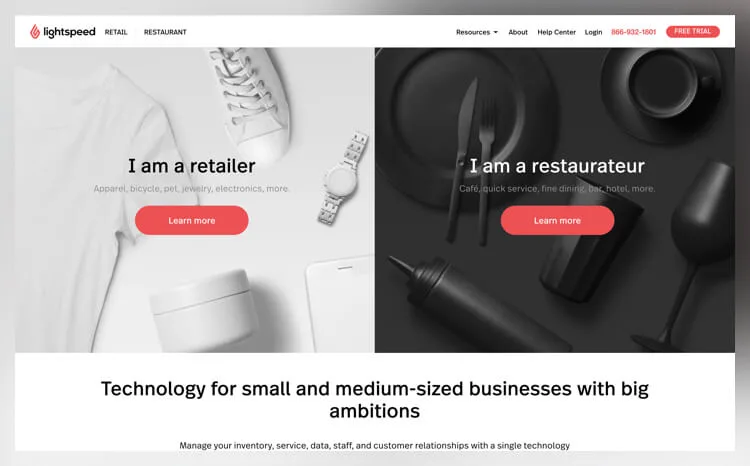
Price Range: $99-$289
Ideal for: Retail and restaurants, everything included
Mobile Compatibility: iPad, mobile extensions
Lightspeed collects all of TouchBistro’s data and updates it for use by both retail and restaurants. Therefore, it offers interesting features such as food management systems and interactive menus for the food industry. Lightspeed’s menu functionality is excellent, with high-resolution photos, descriptions, and prices for each item. You can also set up loyalty programs to reward repeat customers, and a full CRM to track inbound and outbound transactions.
Meanwhile, for retailers, Lightspeed offers a variety of devices to improve efficiency and sales, such as scanners, printers, and electronic cash registers. The POS system also includes sales reporting, merchant services, and an e-commerce platform. In addition, Lightspeed’s inventory management is real-time, so you can immediately notify customers if you have a certain product in stock.
Setup fee: None
Contract length: 14 months
Pros
- Lots of additional hardware options
- Basic plan includes advanced features
- Easy to use and easy to learn visual interface
Cons
- Calculating profit margins can be confusing
- No confirmation when submitting orders via email
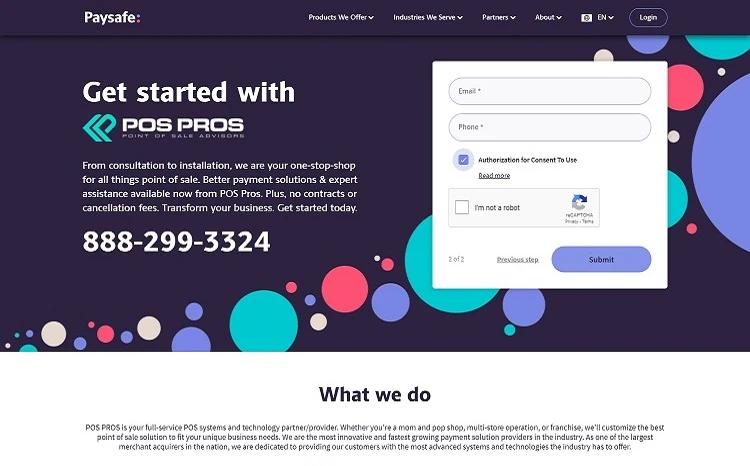
Price range: Varies with partner
Ideal for helping you choose a POS system
Mobile compatibility: Varies with partner
POS Pros is a popular platform that connects business owners with the best POS solutions that fit their needs. It has partnerships with nearly 30 well-known brands, such as Clover and Square. It offers industry-specific solutions, as well as a selection of additional features.
For example, the POS Pros team can help you set up a cashback system, and business owners can request cash back directly from the website. There are no fixed contracts, and overall, I think this is a great option for business owners who need help choosing and implementing the right POS solution.
Why we chose POS Pros: POS Pros is the best choice for those who need help choosing the right POS system for their business.
Our experience: I was impressed with the friendliness of the POS Pros customer service agents. They really make life easier for business owners who need POS advice.
Pros
- Works with nearly 30 partner systems
- Offers industry-specific POS system recommendations
- Friendly and knowledgeable customer service
Cons
- No proprietary POS solutions
- Difficult to cancel
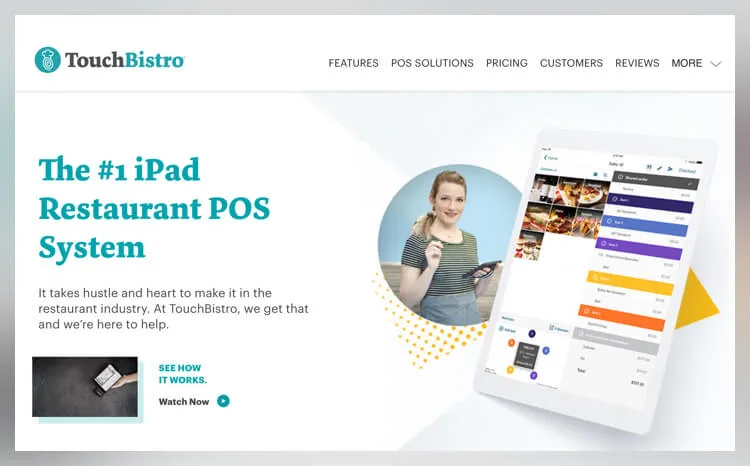
Price range: Packages starting at $105
Ideal for food service businesses
Mobile compatibility: iPhone, iPad, web
TouchBistro is another great option for food service businesses of all sizes. Whether you have a food truck or manage a restaurant, pub, or nightclub, TouchBistro is a POS software that is specifically designed for your industry. This means it includes features that match your needs, pressure points, and customers. Restaurant managers will appreciate features like self-service for faster service, a kitchen display system for smoother communication between servers and kitchen staff, and a digital menu board for instant updates.
In addition to the usual benefits like reporting, analytics, and inventory management, these POS systems are fully equipped with table booking, table management, and menu management features. Managers will also appreciate the scheduling features included with TouchBistro devices, as they greatly simplify staff management.
Now, for a limited time, you can save up to $7,000 on a new restaurant POS with TouchBistro.
Setup costs start at $0.
Contract duration: Monthly
Pros
- Transparent pricing and fees
- Designed specifically for the needs of the foodservice industry.
- $0 commission for online orders, loyalty, reservations, and more
Cons
- Not as well-suited for retail or apparel markets
- Partially web-based
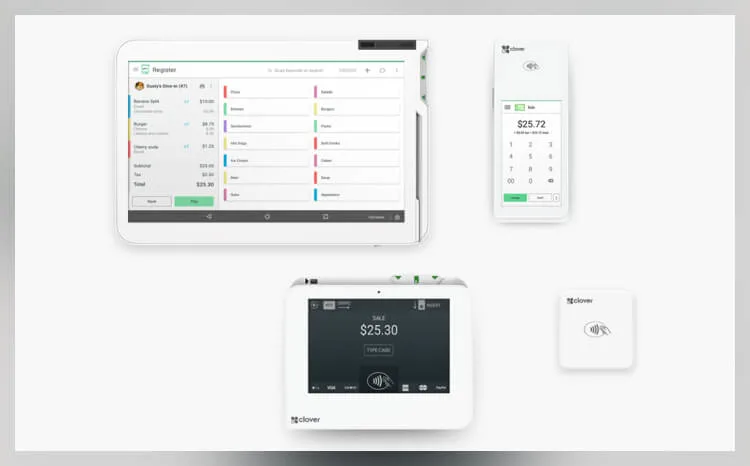
Price range starts at $14
Ideal for growing businesses in any retail or service industry
Mobile compatibility: proprietary devices, not iOS compatible
If you’re already experienced with POS systems, Clover will look familiar. That’s because other POS software providers even use these tools to let you know about the system. Clover POS has all the features you’d expect from a POS system, including integrated payment processing, order management, and a customer management system. It even includes marketing campaigns, loyalty programs, and birthday promotions to help you grow your customer base. Clover also offers other tools like shift management, scheduling, and activity logs.
Of course, if you want to do it all, Clover has great features like customer reviews, guest management, and a gift card generator.
Setup cost: $0 to $1,349
Contract length: No contract required
Pros
- Offers a variety of integrations to expand your functionality
- Easy-to-use software and hardware
- Lots of features included in the basic plan.
Cons
- Android operating system isn’t as smooth as iOS
- You may not be able to use your own payment processor
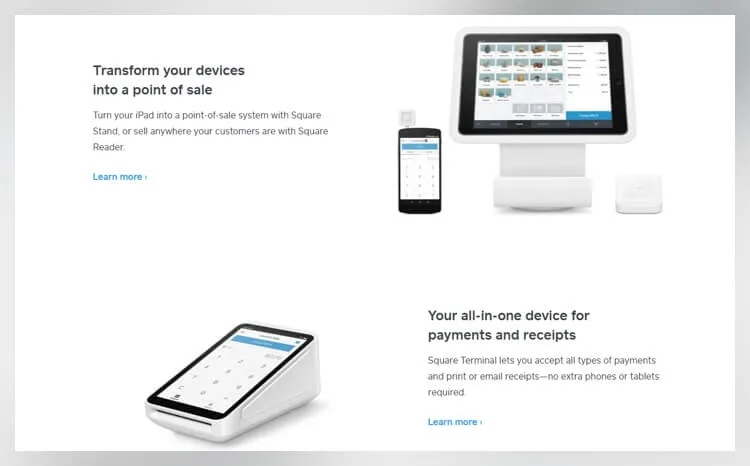
Prices range from 2.5%
Ideal for small to medium-sized businesses with low monthly sales
Mobile compatibility: Fully compatible with iPad and mobile devices
If you don’t live remotely, you’re already more than familiar with Square. It’s arguably the most popular POS system on the market today, and it’s no wonder. With no monthly fees and impressively low prices, Square is a favorite for small businesses looking to save money. You can pay a flat rate of 2.6% + $0.10 for card transactions and 3.5% + $0.15 for major transactions. In case you didn’t know, those are great prices.
Square isn’t just a budget option. The iPad POS system is packed with features like an e-commerce platform, inventory management, and virtual payment terminals. Square is also mobile-friendly, includes a developer API, and has a variety of third-party integrations. While it’s not a good option for high-risk industries, Square is ideal for almost any other type of business, including home delivery, restaurants, and retail.
Setup costs start at $29.
Contract length: No, pay as you go.
Pros
- Excellent reputation for quality and affordability.
- Simple, fixed pricing structure.
- No monthly fees and free chip readers.
Cons
- Not suitable for merchants with high transaction volumes
- Doesn’t work in high-risk areas.
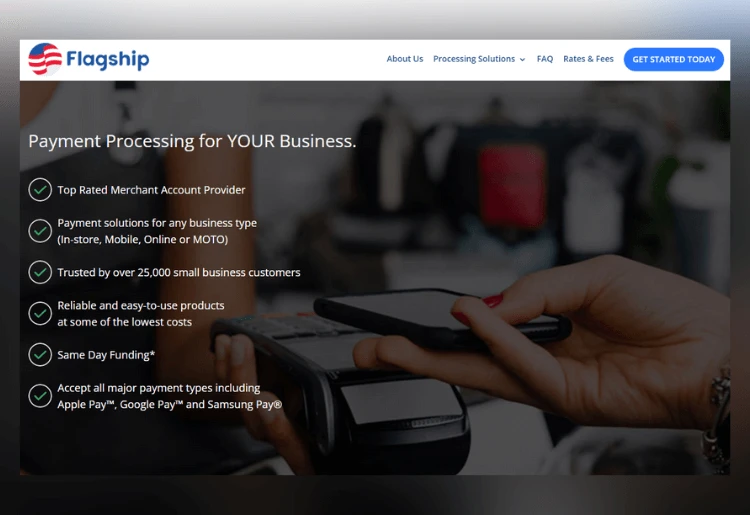
Price Range: Custom Pricing
Ideal for Payment Processing
Mobile Compatibility: Yes, Android and iOS
Flagship is a leading merchant services company known for its advanced, customized payment processing solutions. It offers solutions for businesses of all sizes, including online stores. It’s also easy to use and trusted by over 25,000 small businesses.
One downside is that Flagship’s local point-of-sale offerings are lacking. However, they are a certified reseller of the Clover POS system, which is one of the best we’ve used. Customer support is limited to phone and online chat, but the team is responsive and available 24/7 to help.
Setup costs start at $0
Contract length: Flexible
Pros
- Custom pricing tailored to your business
- Reputation as a leading payment processing provider
- Integrated with Clover POS
Cons
- Limited native POS capabilities
- No live chat support
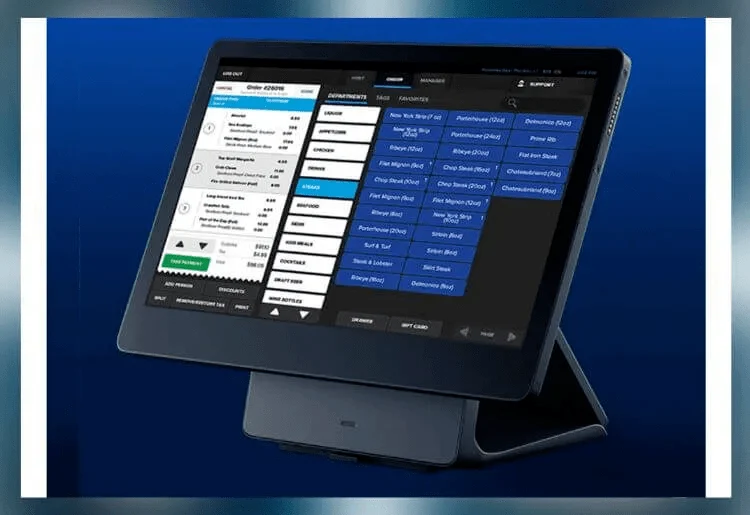
Price range starts at $29.99
Ideal for: Full-service and quick-service restaurants
Mobile compatible: Yes
SkyTab is a great choice for a POS system. It includes state-of-the-art hardware, easy-to-use software, and a wealth of features to help your business run efficiently. With contactless payments via NFC and QR codes, secure payment processing, online ordering capabilities, and customer management tools, you’ll have everything you need to run a successful food and beverage business. Plus, SkyTab provides real-time insights for reporting and analytics to help you monitor your performance.
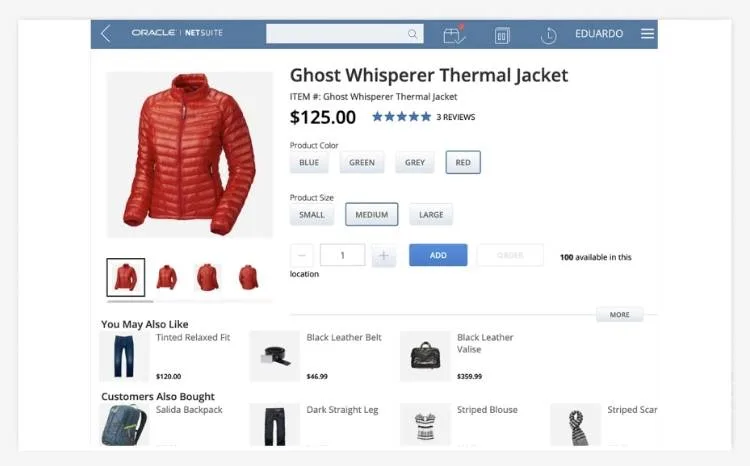
Pricing starts at $999 per license + $99 per user per month + individual module pricing
Ideal for: mid-sized to large retailers
Mobile compatible: Yes
Oracle NetSuite is a unified business management platform that includes several modules, including SuiteCommerce InStore, a point-of-sale solution. SuiteCommerce InStore gives your vendors all the tools they need to support and retain shoppers. It includes advanced customer profiling, order and inventory management, and dynamic merchandising that lets you meet customer preferences at the point of contact.
SuiteCommerce InStore connects your POS system to all of your existing business systems, eliminating the need for integration between separate systems. Its touch-screen tablet interface and responsive design offer easy-to-use digital tools on any device.
Setup fee: None
Contract length: Starting at 1 year.
Pros
- A set of tools that help sellers assist and interact with buyers.
- It connects to your company’s systems, eliminating integrations.
- Available in the cloud, which reduces your software costs.
Cons
- The POS system is only available as a complete package.
- There is no free trial.
Our Methodology: How We Evaluated POS Systems
When comparing the top 10 POS systems, we make sure to consider key features, price, contract length, mobile compatibility, and built-in or cloud functionality. We support credit card or gift card processing. In addition, we examine the strengths of POS systems and what types of businesses they are best suited for.
Our review process is thorough and includes POS experts. Writers and POS experts sign up for various services through brand websites or trusted third parties to gain access to as much information as possible. They visit service websites and review sample contracts, contact sales teams, and pay close attention to customer feedback. Independent agencies like the Better Business Bureau and periodicals are important to ensure a fair and accurate assessment. Our experts also try to use any free trial period to improve the review process.
The Types of POS Software
There are four main types of POS software:
Mobile sales software
This software is cloud-based and offered as an app for smartphones or tablets. It usually supports receipt printers and credit card readers, but is not as powerful as a full-fledged POS system. It is ideal for freelancers like plumbers or food truck owners.
Tablet POS software
A tablet version is similar to a mobile POS software, but offers more features and capabilities. A tablet POS software allows you to manage
Point of Sale (POS) Software
Point of Sale (POS) software is a fixed-base point of sale software with full administrative capabilities. It can be cloud-based or on-premises. It is ideal for large retail or online stores, spas, shopping malls, and other brick-and-mortar businesses.
Terminal POS software
You will also find point of sale software designed for the specific needs of industries such as restaurants and hospitality, clothing stores, financial services, academic and educational institutions, and point of sale software for the pharmaceutical industry.
Self-service or unattended POS software
The cost of your point of sale software will depend on the type of software you choose. Mobile point of sale software, such as a smartphone app, can start at as little as $50 per month, while more sophisticated software can cost several hundred dollars per month. When you purchase point of sale software, you typically pay the initial purchase price plus monthly or annual payment processing fees.
Other factors that can affect the cost of your point of sale software packages include:
- How many features are you adding?
- Hardware included?
- Number of integrations?
- Your operating system?
POS Systems Costs
The price of POS systems varies significantly depending on the type and size of business you are building. There are two costs to consider when looking for a POS system: monthly software and installation fees.
The monthly cost of software ranges from $0 to $100 or more. Most paid POS software costs between $15 and $30 per month. Installation fees typically include both software and hardware installation. Paid POS systems don’t always have user limits, meaning an unlimited number of employees can use the software to process transactions.
Of course, there are “free” POS systems. This means that the hardware and monthly plans start at $0, but the business is charged a fee each time a switch is made. For example, a POS provider may charge anywhere from 2% to 4% plus a few cents for card transactions or manually entered sales.
Getting the Right POS Hardware
POS hardware is another important part of your POS system. Ideally, you’ll need the right hardware for the operations and transactions you want to perform with your POS system. Basic POS hardware includes:
- A printer to print receipts (retail stores, restaurants, and other brick-and-mortar businesses will likely need this).
- A POS terminal or iPad or Android tablet to run your POS software.
- A credit card reader.
- A cash register to securely store cash transactions and record them in your system.
Depending on your business, you may also need:
- Additional tablets to serve as servers to process payments at the restaurant’s table.
- A router to power the internet for cloud POS systems.
- A local server to host your local POS software.
- Scales for grocery stores.
- Barcode scanners.
- Network cables to connect all your equipment.
- Additional kitchen printer.
- Self-service payment kiosks.
If you have long-term business plans and your needs are likely to change as your business grows, a cloud-based POS system is probably the best option. On the other hand, if you have fixed needs or a small budget, you may be better off choosing a traditional POS system.
The Benefits of a POS System for Your Business
With a POS system, your business can gain more customer loyalty through a more effective and targeted loyalty program, as well as track inventory to avoid unexpected stock shortages. A POS system can help you implement complex discount offers when needed.
With the right POS system, you can also analyze sales history to identify purchase correlations and seasonal trends, which can be helpful in increasing sales. You can also eliminate manual errors with barcode scanners and automatic synchronization, and combat absenteeism with a more reliable employee tracking system.
Other key benefits include increased payment security and the ability to drive more sales by accepting marketplace payments.
Cloud-based POS systems vs. on-premise POS systems
A cloud POS system stores data on remote servers and can be accessed online, while a traditional or on-premise POS system stores data on a local server and can be accessed via an internal network. Below are the key differences between a cloud POS and an on-premise POS:
If you have long-term business plans and your needs are likely to evolve as your business grows, a cloud-based POS system is probably the best option. On the other hand, if you have fixed needs or a limited budget, you may be better off choosing a traditional POS system.
How to Choose a POS System Provider
Choosing a POS system provider depends on the type of business you have, its age, and the scale of your operations.
Here are some questions, categorized by category, that can help you choose the right POS system provider.
Equipment and features
- What features do I need?
- What hardware do I need to process payments?
- What hardware do I need?
If you need a lot of products, a provider that includes both hardware and software options is a better choice, but if you’re going to use your current iPad, you’ll need more.
- What types of receipts are generated?
Point of sale installation
- Does the POS system integrate well with my current business applications?
- Is it easy to set up and use? If it’s more complex, do they offer training?
- How good is the customer service?
Costs
- Do I want to save on a down payment or keep monthly costs low?
- How does payment processing work? What kind of hardware does the POS company offer?
- Is the pricing transparent?
- Are payment processes cloud-based or more suitable for in-person transactions?
Scalability
- What analytics does it offer and what metrics can you view? Make sure the package includes what’s most important to you.
- Does this POS system offer support for inventory management, such as replenishment, warehousing, inventory and order analytics, or multi-channel tracking?
- Does this POS system have integrations for e-commerce, email marketing, or social media? The operating system can provide real-time insights to improve the customer experience.
- Is it easy to scale as your business grows?

